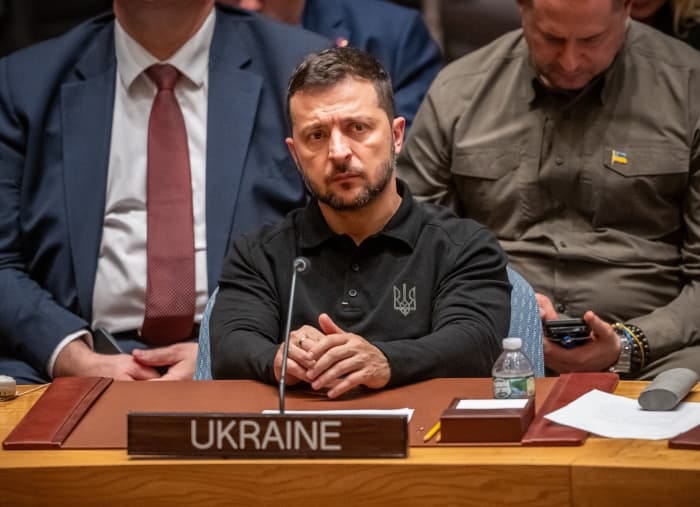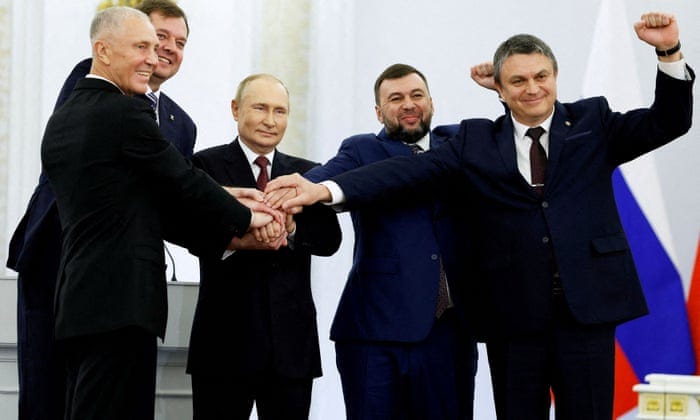As we approach the presidential elections on November 5, I decided to change the normal format of these “Reflections” and introduce a couple of new features that might be helpful to my readers and those attending my classes.
Since February 2022, I have been tracking the struggle between Ukraine and Russia, and along the way I have gained insights and identified helpful resources for understanding this conflict — both its context and its larger implications. Below, I will outline some of these insights and provide information about some of the resources I have relied on and reached for, in my studies and writing on the war.
Basic Insights
Putin is an oligarch who has built his regime while stealing the wealth of his country for his family and cronies like a typical mafia don. He needs war to protect his political power and to justify repression of domestic resistance, while hiding his stolen assets in overseas financial institutions. He has been engaged in eight wars since he became Russia’s leader, and he will not voluntarily end the war with Ukraine unless Russia is defeated on the battlefield.
Foreign policy scholars who study oligarchy have noted that when dictatorships collapse, they are often very brittle and have few defenders. When the Romanov dynasty imploded during World War I and the USSR dissolved in 1991, there was little resistance or any attempt to restore them to power. I expect the same will happen when Putin’s time is over. Few oligarchs die in their own beds!
Putin and his National Security Council colleagues have repeatedly identified Russia’s next targets, so their intentions as the conflict continues and possibly expands will be aimed at Poland, Finland, and the Baltic States (Lithuania, Estonia, and Latvia), among others. This is no secret, and NATO knows what is coming if Russia is able to defeat Ukraine.
The U. S. Secretary of Defense, Lloyd Austin, has made it very clear that if Russia defeats Ukraine, our country and NATO will have to fight Russia and the costs will far exceed our current level of support for Ukraine.
It is important to understand that Ukraine will not surrender to the Russians, regardless of what happens on the battlefield. They will continue the struggle against Russian invaders with fierce partisan warfare, even if NATO countries begin to withdraw their support from the conflict. Ukrainians have made it clear by their bravery and their heroism against a vastly larger enemy, that Russia’s empire will no longer include their country.
Russia has suffered enormous losses in this war, a fact that is often overlooked by western media sources. It is a remarkable feat that Ukraine, which does not have a significant navy, utilized drone and missile technology in April 2022 to sink the flagship of the Russian Black Sea Fleet, the Moskva. Ukraine then severely damaged or destroyed multiple warships and a submarine in 2023, as well as bombing the Black Sea Fleet headquarters in Sevastopol. By early March 2023, Ukraine had sunk or damaged one-third of the entire Black Sea fleet – a remarkable achievement and a humiliation for Putin’s regime. In addition, Ukraine has reopened the shipping lanes for the export of their agricultural products to Africa, Asia, and the Middle East.
One of the Achilles’ heels that the leadership of oligarchies face is the “information cocoon.” Over time, the dictator finds himself living in a reality in which staff and cronies tell him only what he wants to hear, fearful that sharing bad news will jeopardize their career. Not telling the truth to Putin’s leadership team has resulted in many Russian miscalculations about how to wage the war.
Why have Russians been so passive in terms of their criticism of Putin’s war efforts? Putin and his security forces have increased the repression in Russia to levels unseen since the bloody days of Joseph Stalin’s “Red Terror.” Russians have survived Putin’s regime by “learned indifference,” an unwritten social contract that teaches them to be quiet and patriotic citizens. They can focus on their everyday life, concentrate on their private problems, and let Kremlin handle the rest. This what life is like in an oligarchy.
Despite reports from the news media in the States, the war in Ukraine is not at a “stalemate.” For example, on Tuesday, October 1, 110 combat clashes took place along the front lines. Since the start of the Russian invasion, Russian losses of soldiers has grown from 500 deaths a day, to more than 1,000 a day. How long can this be sustained?
Will either presidential candidate and their advisers made a definitive decision to supply the Ukrainians with the weapons and ammunition they need now to drive the Russians out of their country and let them take it from there? This is one of the many critical decisions facing the new American president and it deserves to be carefully followed.
Helpful Resources:
Here are three of the most qualified analysts on the subject of the war in Ukraine. All three are fluent in the languages spoken in this part of the world, travel regularly to visit the countries involved, and know the leadership on both sides of the conflict. I will share the names of other top experts in future updates.
Professor Timothy Snyder (Yale University)
Newest book: On Freedom
Substack: “Thinking About…”
Journalist/Historian Anne Applebaum
Newest book: Autocracy, Inc.: The Dictators Who Want to Run the World
Articles: The Atlantic
Emeritus Professor of War Studies Lawrence Freedman (King’s College London)
Recent essay: “Who’s Afraid of Vladimir Putin?”
Substack: “Comment is Freed”
Dr. John A. Bernbaum
Educator & Writer
Grand Rapids, Michigan








